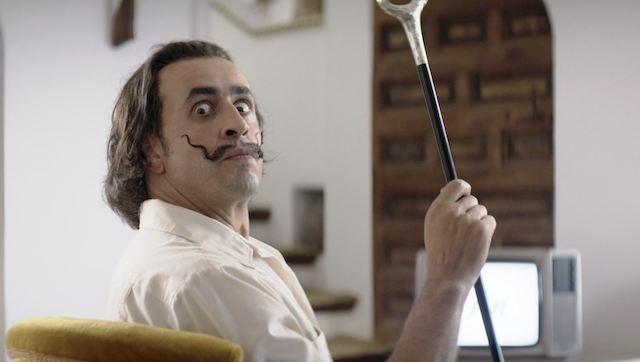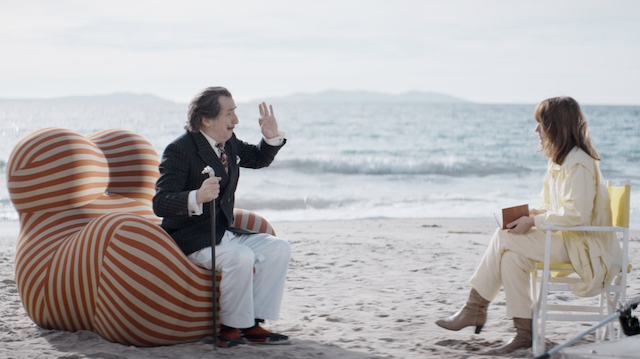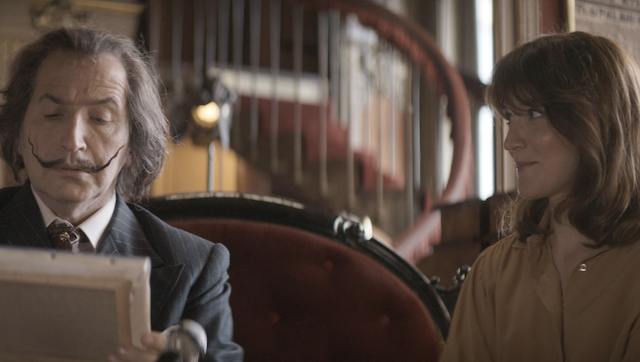
If Mary Harron’s 2022 Dalíland — starring Ben Kingsley — took a biographical twist, Quentin Dupieux prefers to embark upon an exercise of style, since his latest work is not a biopic about Salvador Dalí. The French filmmaker’s moving picture — that premiered Out of Competition at the 80th Venice International Film Festival — is a cinematic Matryoshka. Daaaaaalí! is a filmic divertissement of Chinese boxes, where events intertwine with dreams and the thin line between what is real and what is imagined gets blurrier by the minute.
The actual protagonist is former-pharmacist-now-turned-journalist Judith Rochant (Anaïs Demoustier), who is assigned to interview renowned artist Salvador Dalí. But the surrealist painter disdains the print media and would rather be interviewed on camera. Thus, Judith embarks upon the mission of making a documentary portrait of Dalí, with the help of her producer Jérôme (Romain Duris). During this challenging plight Judith confronts the many facets of Dalí’s ego. Hence, it doesn’t surprise to see the surrealist artist played by five actors: Edouard Baer, Jonathan Cohen, Giles Lellouche, Pio Marmaï, and Didier Flamand. If this weren’t enough, there’s an amusing supper scene à la Luis Buñuel — that follows its own illogic flow — where Dalí and his wife Gala (Catherine Schaub-Abkarian) converse with their friend Georges (Laurent Nicolas) and a priest, Père Jacques (Éric Naggar), who describes a recurring dream with several variations.
Daaaaaalí! is about the metamorphosis of life and its creative forms and, above all, it genuinely enjoys mocking its audience. The picture also exposes the sense of failure that pervades all human beings, who question themselves whether they are up to the task they’ve set themselves and have to come to terms with the relativity of events. Judith’s numerous attempts to interview the extravagant sacred monster of Surrealism, lay bare his prismatic nature. After all, as Dalí himself once said, his personality was probably his greatest masterpiece. Daaaaaalí! investigates this cosmic consciousness in a flamboyantly freewheeling manner.
 Even though the film is not a faithful depiction of the artist’s life it does claim the will to do justice to his work. There are several references to his paintings, such as a skull on a donkey’s head, a landscape, a signature. Most importantly, the movie opens with a shot that reproduces the artist’s Necrophilic Fountain. Usually pop culture associates Dalí with his melted clocks. Dupieux’s choice of beginning the visual journey with a piano, being traversed by water and a tree, sets the mood for an unexpected journey into the exploration of Salvador Dalí’s lesser known world. It is also an ingenious way to coalesce the two creative fields of cinema and painting. And exactly as Dupieux said “From here, you’re in for a ride. A Dalí roller coaster.” Indeed…it is quite the trip!
Even though the film is not a faithful depiction of the artist’s life it does claim the will to do justice to his work. There are several references to his paintings, such as a skull on a donkey’s head, a landscape, a signature. Most importantly, the movie opens with a shot that reproduces the artist’s Necrophilic Fountain. Usually pop culture associates Dalí with his melted clocks. Dupieux’s choice of beginning the visual journey with a piano, being traversed by water and a tree, sets the mood for an unexpected journey into the exploration of Salvador Dalí’s lesser known world. It is also an ingenious way to coalesce the two creative fields of cinema and painting. And exactly as Dupieux said “From here, you’re in for a ride. A Dalí roller coaster.” Indeed…it is quite the trip!
The greatest men in literature have ventured into the distinction between reality and dreams, by using their words. Edgar Allan Poe’s poem A Dream Within A Dream pondered upon the flightiness of life; whilst William Shakespeare’s character of Hamlet in his famous soliloquy To Be Or Not To Be, expressed the same disquietude when he pronounced the words “To die, to sleep – to sleep, perchance to dream – ay, there’s the rub, for in this sleep of death what dreams may come. When we have shuffled off this mortal coil, Must give us pause—there’s the respect, That makes calamity of so long life.” Salvador Dalí tackled the same existential issues — including the haunting shadow of death — using his paintbrush, and the same can be said of Quentin Dupieux who does so with his camera.
This surrealistic comedy, about vanity and art, is structured like a scavenger hunt that continuously gets stuck in a loop, just like the amour propre of its capricious protagonist…epitomised by the many ‘A’s in the film’s title. The eccentric tableau vivant is aggrandised by the music score of former Daft Punk member, Thomas Bangalter.
Daaaaaalí! yearns to be utterly disorientating and succeeds in its intention, as Quentin Dupieux makes a surreal film about a surrealist.

Final Grade: B
Check out more of Chiara’s articles.
Photos are courtesy of Music Box Films

